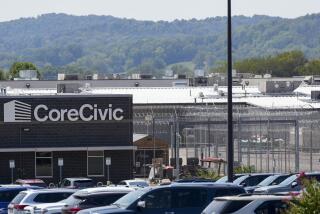Policy of Mixing Prison Gangs Under Study
FRESNO — At the behest of the governor’s office, the state Department of Corrections will reconsider its controversial practice of mixing rival gang members at Corcoran State Prison.
This integration policy has resulted in countless fights between black and Latino gang members in the tiny recreation yards at Corcoran’s security housing unit, according to prison staff. The fights have led to dozens of shootings in which guards fired gas guns and carbine rifles to break up the fights, sometimes hitting and killing the wrong inmate.
“The integration policy at Corcoran will undergo a careful assessment,” said Sean Walsh, the governor’s press spokesman. “Upon that review, any needed adjustments to the policy will be made to ensure the safety of correctional officers and the safety of the institution.”
Since Corcoran opened in 1988, seven inmates have been shot dead by guards trying to break up fights--all but one taking place in the security housing unit. This is more inmate killings than at any other prison in the country.
One death, the 1994 killing of inmate Preston Tate, has sparked a two-year FBI investigation into allegations of murder, torture and cover-up at the hands of Corcoran staff. A federal grand jury has been meeting in Fresno to weigh possible criminal indictments.
A Times story last week revealed that in response to the federal probe, Corcoran had quietly stopped placing rival gang members in the same SHU yard. Fights were no longer an everyday occurrence in the special unit that houses some of the state’s most incorrigible inmates. Not one inmate had been killed in over a year.
The policy change apparently was done, however, without the knowledge of state prison officials. When they found out last week, they ordered Corcoran to immediately begin integrating the SHU yard again. This prompted critics to charge that the corrections department was digging in its heels by insisting on a flawed policy that would only lead to more fights and shootings. Although the governor has shied away from making any statements about Corcoran’s troubles, his aides met Friday with corrections Director James H. Gomez and expressed concern over integrating the yard.
“We’ve been assured by Mr. Gomez that he is giving his full attention to Corcoran’s integration policy,” Walsh said.
Integration is not considered a major problem on the main yards of California’s 32 prisons because these yards are big enough for each rival gang to carve out its own turf. The Corcoran unit, by contrast, measures half a basketball court. Mixing 20 inmates at a time in this cramped setting--rival gang members with a history of bad blood--is baiting them to fight, critics say.
“The Corcoran SHU is the only one of its kind in the state,” said Catherine Campbell, a Fresno attorney suing the state on behalf of the Tate family. “The yards are too small to be integrated without violence. There’s every legal and moral reason to segregate these gangs.”
But Campbell and others emphasize that integration is only one issue troubling what is now considered one of the most brutal prisons in the country.
In the Times’ story, two captains, two lieutenants and a correctional officer described abusive treatment of inmates by prison staff who staged inmate fights in the security yard in a ritual that became known as “gladiator day.” When inmates refused to obey verbal orders to stop fighting, guards shot them with the gas gun or carbine.
Staff also kicked and punched shackled prisoners and schooled officers on how to cover up the abuses in official reports, according to the five current and former officers cooperating with investigators. Last summer, even as FBI agents were gathering evidence at Corcoran, 36 inmates were taken off a bus and beaten by correctional officers who call themselves “the Sharks.”
Eight supervisors, including an associate warden and a captain, have been fired, suspended or demoted over the mass beating. The officers, contending that they have become political pawns, are appealing their punishment.
Calling the abuses at Corcoran outrageous, Walsh said they cannot be tolerated.
More to Read
Sign up for Essential California
The most important California stories and recommendations in your inbox every morning.
You may occasionally receive promotional content from the Los Angeles Times.










